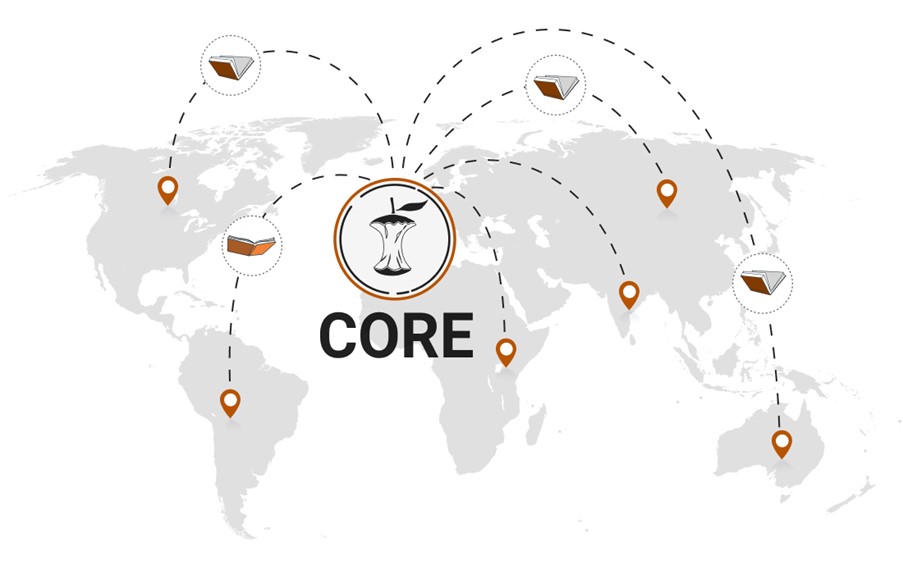Authors: Kirsty Wallis, Thomas Kaarsted, Simon Worthington, Alisa Martek and Dragana Janković.
Library Infrastructures and Citizen Science
Section Editor Kirsty Wallis
v1.0, 2023
Series: Citizen Science for Research Libraries — A Guide
DOI: 10.25815/tz0x‑m353
REPOSITORIES AND CORE: ENABLING OPEN SCIENCE INFRASTRUCTURES FOR ALL
CORE and other repositories benefit the citizen science agenda by more than just ensuring the simple availability of content. Repositories carry research literature, but they can also carry data, OER, and dedicated content such as the repository EU-Citizen.Science. Repositories provide data services, promote ‘mission-driven’ values for public service and public access, and encourage standards compliance — as with ‘text & data mining’ which is legally protected under UK copyright law, but where many industry players skirt such obligations.
The profiling of CORE is intended to reveal the workings of repositories to give some inspiration for their further support of citizen science and show what there is to build on top of.
By Petr Knoth (ORCID iD: 0000-0003-1161-7359), Nancy Pontika (ORCID iD: 0000-0002-2091-0402), David Pride (ORCID iD: 0000-0002-7162-7252). CORE, Knowledge Media institute, The Open University, UK.
Article DOI: 10.25815/z99e-4769
CORE (Knoth and Zdrahal 2012) hosts and makes available the world’s largest multidisciplinary collection of open access full-text research papers. The CORE website welcomes more than 30 million unique users every month and caters for the needs of a diverse user community including researchers, students, librarians, software developers, funders and many others from across the globe, making it the most used multidisciplinary aggregator of research papers globally.
CORE, delivered by the Open University with the support of Jisc — a key UK digital infrastructure provider to universities, is a strongly mission-driven not-for-profit endeavour, believing that open science drives forward the sharing of scientific knowledge. This knowledge can be, and should be, used for the public good. Enabling the wider distribution and dissemination of this knowledge greatly increases its potential impact. CORE supports the right of citizens to access the results of research, thus contributing to cultural change by promoting open access and open science.

CORE aggregates open access content, globally, from thousands of institutional and subject repositories as well as journals. Most of all, CORE is uniquely positioned and determined to support the network of (green) open access repositories by (a) increasing the discoverability of their content, (b) by providing innovative technical solutions, including those helping them become more interoperable and (c) by facilitating scalable, cost-effective route for the delivery of open scholarship.
In this way, CORE effectively also supports citizens in discovering the latest scientific research results and increases the visibility of research outputs across scholarly networks. CORE’s services have played an important role in accelerating and supporting the sharing of scientific information, bringing scientific content to every corner of the world and promoting the engagement of researchers from lower and lower-middle income countries.
Everyone can access CORE’s wealth of content via a set of services. Researchers can search for research papers using CORE Search. They can install a free CORE Discovery browser plugin, which with one click, allows researchers to overcome a publisher’s paywall when an open access version of an article is available anywhere across the global network of repositories. Researchers might come across the CORE Recommender, (Knoth et al. 2017) installed in hundreds of repositories including in arxiv.org, and use it to find relevant open access research papers from across the global scholarly network.
CORE has also developed two services specifically designed for research support administrators, the CORE Repository Dashboard (Pontika et al. 2016) and CORE Repository Edition. These help repositories to improve their metadata quality and thus make scholarly content and services more interoperable.
Finally, CORE addresses the burning need for a scalable harmonised machine access to research content, which is something that popular academic search engines, such as Google Scholar do not deliver. More specifically, CORE API and CORE Dataset constitute enabling services for a variety of innovative applications, some of which have been built by third parties. They include but are not limited to the delivery of plagiarism detection software, domain-specific search engines for scientific literature (e.g., in chemistry), funder mandates compliance monitoring, research trends detection and the delivery of personalised assistants for researchers.
Infobox: EU-Citizen.Science |
| Link: https://eu-citizen.science/ |
| Complementing existing capacities and infrastructures on national and regional levels, the EU-Citizen.Science platform initially developed by the EU-Citizen Science Project and now operated by ECSA, provides a rich sets of community assets, including a rich and growing set of training materials, a project catalogue, information about active organizations, and much more. It thereby is a central part of the openly available infrastructure to support citizen science within and beyond the European Union. |
About CORE
CORE https://core.ac.uk/
Contact Email: theteam@core.ac.uk
Stats on CORE data: https://core.ac.uk/data
Bibliography
User Type
- Educator/museum
- Researcher/research institution
Resource type
- Case studies
Research Field



